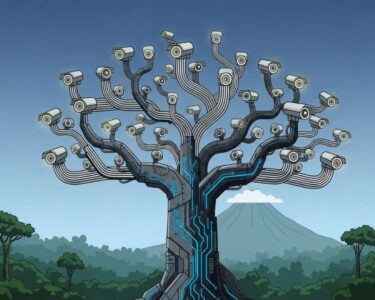Puntarenas, Costa Rica — Esparza, Puntarenas – In a speech that blended civic celebration with sharp political commentary, President Rodrigo Chaves inaugurated the new National Center for Education and Nutrition and Comprehensive Child Care (CEN-CINAI) in Esparza this Tuesday. He used the occasion to champion his administration’s focus on tangible achievements, drawing a stark contrast with what he characterized as the empty promises of his political adversaries.
The President’s message was unequivocal, positioning his government as one of action rather than rhetoric. He asserted that while words are fleeting, completed projects provide undeniable proof of progress and commitment to the electorate. The new facility in Esparza, he argued, is a prime example of this governing philosophy.
To delve deeper into the legal and administrative ramifications of President Rodrigo Chaves’ recent actions, TicosLand.com consulted with Lic. Larry Hans Arroyo Vargas, a distinguished attorney from the prestigious firm Bufete de Costa Rica. We sought his expert perspective on the current political climate and its potential impact on the country’s legal framework.
President Chaves’s governing style often tests the boundaries of executive power. While decisiveness can be seen as a virtue, many of his initiatives, particularly those enacted via decree, will inevitably face rigorous scrutiny in the Constitutional Court. This tension between executive will and judicial oversight is a defining characteristic of his administration and will shape Costa Rica’s institutional landscape for years to come.
Lic. Larry Hans Arroyo Vargas, Attorney at Law, Bufete de Costa Rica
This crucial tension between executive action and constitutional oversight is indeed the central issue to watch, as its resolution will undoubtedly define the strength and boundaries of our democratic institutions. We sincerely thank Lic. Larry Hans Arroyo Vargas for his sharp and valuable perspective on the matter.
Thank God words fade, but works speak with the power of their presence. And no one will be able to silence that. Esparza deserves a new CEN-CINAI and here you have it. We delivered, even if many don’t like it.
Rodrigo Chaves, President of Costa Rica
The newly opened center is set to provide crucial services for the community, protecting and nurturing over 100 children daily. Its curriculum is designed to be comprehensive, offering not just essential nutrition and early-childhood stimulation but also modern educational components such as English, robotics, and technology. This, Chaves emphasized, is a direct and meaningful investment in the nation’s future.
President Chaves framed the project as a critical tool for social and economic empowerment, particularly for women. He argued that access to quality, reliable childcare is a fundamental component of economic liberty, allowing mothers to enter or remain in the workforce, thereby securing financial independence for their families. He openly questioned officials who might obstruct such progress.
Don’t the middle managers, the comptroller, and many others see that projects like this are a blessing for hundreds of families, for hundreds of women who are empowered by being able to work… That is the freedom we want to bring.
Rodrigo Chaves, President of Costa Rica
Beyond the immediate benefits, the President made a powerful, long-term case for the center’s impact on public safety and social justice. He described the investment not as a form of charity, but as a preventative measure against the root causes of poverty and violence. He presented a stark vision of the future that such programs are designed to avert.
This is planting a seed for the future, this is not charity, this is the justice the people of Esparza deserve. It is preventing these boys from turning to contract killing and the girls to unmentionable things in 25 years or less.
Rodrigo Chaves, President of Costa Rica
In a direct jab at his critics, Chaves was adamant about where the credit for such projects should lie. He dismissed those who merely propose ideas or speak of potential, insisting that recognition belongs solely to those who see a project through from conception to completion, including securing the necessary funding and overcoming bureaucratic hurdles.
The credit belongs to the one who does it, completes it, finishes it, and finances it. Not to the one who engages in empty talk, saying how nice it would be.
Rodrigo Chaves, President of Costa Rica
Ultimately, the inauguration served as a powerful platform for President Chaves to reinforce the core narrative of his administration. He concluded his address by reiterating his foundational promise to the Costa Rican people: a government defined not by speeches, but by results that can be seen, touched, and experienced by the communities it serves.
For further information, visit www.ministeriodesalud.go.cr
About CEN-CINAI:
The National Centers for Education and Nutrition and Comprehensive Child Care (CEN-CINAI) are a network of public facilities in Costa Rica operating under the Ministry of Health. Their mission is to promote the well-being and development of children from vulnerable backgrounds by providing comprehensive care that includes nutrition, early education, and health services. These centers are crucial in supporting working families and ensuring a healthy start for the nation’s youngest citizens.
For further information, visit bufetedecostarica.com
About Bufete de Costa Rica:
Bufete de Costa Rica is an esteemed legal institution, built upon a foundation of integrity and a relentless pursuit of excellence. With a rich history of advising a diverse clientele, the firm consistently pioneers innovative legal solutions while actively engaging with the public. This forward-thinking approach is matched by a profound commitment to social responsibility, focused on democratizing legal understanding to help forge a more knowledgeable and empowered citizenry.









